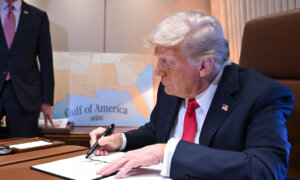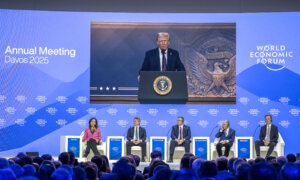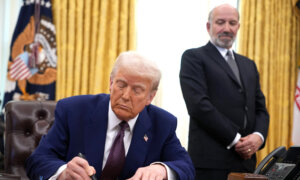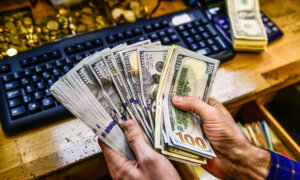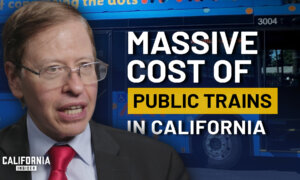Commentary
The U.S. Dollar Index is up by about 5 percent so far this quarter, as the U.S. is the resurgent economic oasis for most of the rest of the world—in its stock market, currency, and now its bond market, as long-term interest rates on the 10-year Treasury declined to 4.15 percent on Dec. 6 from 4.5 percent on Nov. 15.
The U.S. political scene is also taking shape under Trump 2.0, and the U.S. economy is growing, while Europe is clearly sinking into recession and is leaderless and rudderless in its major economies.
The crisis in Europe is deepening each week. On Dec. 4, the French government collapsed over a budget battle, and Marine Le Pen’s National Party pushed a no-confidence vote that passed with 331 votes (well more than the 288 votes required), which could force a new election there within 60 days. As a result, a minority coalition is ruling France and President Emmanuel Macron is constantly fighting with Le Pen’s National Party, which has the most seats in Parliament. Macron has not declared a new election, so he is now effectively a lame duck.
In a nationwide address on the evening of Dec. 5, Macron refused to step down, saying, “The mandate you gave me is for five years, and I will exercise it fully.”
Here are the most important market news items and what this news means:
• Assuming that the eurozone chaos persists, do not be surprised if the euro “breaks a buck” against the U.S. dollar. The fact that the eurozone is now in a recession and the European Central Bank (ECB) will be slashing key interest rates is undermining the euro. In fact, a Bloomberg survey is now forecasting that the ECB will cut its key interest rate to 2 percent by June 2023 (currently the key ECB interest rate is 3.25 percent). As European interest rates decline, it should trigger a big rally in U.S. Treasuries that should also encourage the Fed to cut key interest rates.
• The consensus concerning the fall of Bashar al-Assad’s regime in Syria after 50 years of rule is that Iran and Russia’s influence is waning. There is clearly a leadership vacuum in the Middle East, so it will be interesting to see which countries establish diplomatic relations with Syria’s new leader.
• Although the chaos in South Korea has not spread to other Asian nations, the unrest there should continue to prop up the U.S. dollar. South Korean President Yoon Suk Yeol escaped impeachment after imposing martial law for six hours to suppress opposition protests. Naturally, the martial law imposition has ignited opposition groups, so President Yoon Suk Yeol has lost the support of the vast majority of South Korea’s citizens.
• Brazil’s President Luiz Inácio Lula da Silva had emergency brain surgery in São Paulo. Lula is awake and recovering, but only time will tell if he fully recovers. Lula has been a big proponent of boosting China’s influence and encouraging trading in Chinese yuan versus the U.S. dollar on international transactions. Naturally, China has invested heavily in Brazil, so Lula has effectively become a Chinese puppet. In the event that Lula is replaced, it will be interesting to see if the next president continues to promote the yuan over the U.S. dollar, especially in light of the fact that President-elect Donald Trump proposed 100 percent tariffs on the BRICS countries that are undermining the U.S. dollar’s influence.
• China opened a probe into Nvidia over whether the company broke anti-monopoly laws. My comment is that of course Nvidia is a monopoly, which is why it has fat operating margins. The technology curbs between the United States and China have escalated under the Biden administration, so it will be interesting to see whether Trump 2.0 modifies these technology restrictions between the United States and China. In the meantime, Nvidia is a great near-term buy.
• The National Bureau of Statistics in China announced that its consumer price index (CPI) rose by 0.2 percent in November, down from a 0.3 percent rise in October. Economists were expecting consumer prices to rise by 0.5 percent in November, so a weak economy is clearly suppressing consumer inflation in China. Even more interesting is that China’s producer price index (PPI) declined by 2.5 percent in November compared to a 2.9 percent decline in October. China’s PPI has declined for 26 straight months. Deflation is rampant in China because of its domestic real estate crisis, a shrinking population, and lackluster manufacturing activity. Eventually, the United States should start importing Chinese deflation in goods, despite higher tariffs.
Overall, the United States has a huge economic advantage compared with every other large or advanced nation. It is clear that under Trump 2.0, the incoming administration intends to exploit this clear U.S. advantage to negotiate better trade deals and impose matching tariffs on uncooperative countries.
Views expressed in this article are opinions of the author and do not necessarily reflect the views of The Epoch Times.



